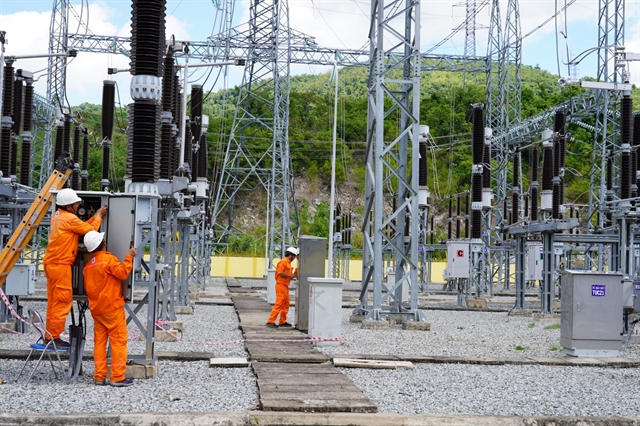 Economy
Economy


|
| Workers of Việt Nam Electricity (EVN) - a State owned enterprise, check on a power station. — Photo courtesy of EVN |
HÀ NỘI — State-owned enterprises (SOEs) need to undertake big, difficult, and new tasks to create momentum for economic development, leaving space for the development of private enterprises in other fields.
Đỗ Thành Trung, Deputy Minister of Planning and Investment, made the statement at a seminar titled “State capital management in enterprises: Looking Back and Moving Forward” held in Hà Nội on Tuesday.
Although SOEs only account for a small proportion of the economy, they hold many important resources for the country's socio-economic development, according to the deputy minister.
During nearly 40 years of Đổi mới (Renewal), the Vietnamese business community in general and SOEs in particular have made unremitting efforts, overcoming many difficulties and challenges, continuing to affirm their leading role in steering the economy.
SOEs are also a sector that constructs and develops vital economic infrastructure and key industries to create motivation for economic development, especially when the private sector is not yet robust.
However, the Deputy Minister of Planning and Investment stated that, in addition to the results achieved, the production and business activities of SOEs, especially investment activities in recent times, still had some shortcomings and limitations.
He said SOEs were slowly adapting in the new era and context. Their role in leading, motivating, paving the way, and promoting other economic sectors had not been clearly emphasised. The investment in improving innovation capacity was still limited, especially in industries capable of guiding economic structural transformation such as core technologies and digital technology; new energy industries, and clean energy.
In particular, the SOEs’ competitiveness, especially in international competition, was still restricted, as they could only dominate the domestic market but were not able to compete and penetrate foreign markets. The firms did not have key export products that would create high added value, while exports were an important criterion to most accurately assess the competitiveness of enterprises in the global market, he said.
“SOEs have good operating efficiency but are not commensurate with their resources, especially with the total assets of more than VNĐ3.7 quadrillion of the country,” he added.
To align with the country’s development requirements in the forthcoming period, the Deputy Minister said: “It is essential to identify and reassess the position and role of SOEs, thereby clarifying the objective of organising and reforming the SOE sector in line with the actual situation of Việt Nam.”
The Government should discuss and propose directions for innovating the method of managing State capital in enterprises to promote the assignment and decentralisation of the execution of rights and responsibilities of the owner's representative agency, particularly solutions to enhance the role of the Commission for Management of State Capital at Enterprises (CMSC).
"The CMSC needs to perform the role of a conductor in co-ordinating and mobilising resources of 19 enterprises to serve socio-economic development,” he added.
Phạm Văn Sơn, CMSC’s Director of the General Department, said they were assigned to represent the owner of 19 groups and corporations operating in production and business across 16 economic sectors.
By 2022, the total consolidated equity of these 19 groups and corporations reached VNĐ1.15 quadrillion. Their total consolidated assets amounted to VNĐ2.49 quadrillion, accounting for about 63 per cent of total equity and 65 per cent of total assets of SOEs in the country.
After 5 years of transferring to the CMSC, the 19 groups and corporations approved, implemented, and completed investments in 185 group A projects and 455 group B projects. Between 2018 and 2023, the commission directed and coordinated with groups and corporations to implement development investment plans with a total investment of VNĐ770 trillion.
“The commission has reported, proposed, and received approval from competent authorities for handling plans for 8 out of 12 projects, assigning businesses responsibility for implementation,” Sơn said.
For the remaining four slow-moving and ineffective projects, the CMSC submitted handling plans for three projects to the Prime Minister, including: Dung Quất Shipbuilding Industry One Member JSC; Phase 2 production expansion project of Thái Nguyên Iron and Steel Factory - Tisco 2, and Quý Xa iron ore mining project, Lào Cai Iron and Steel Factory, and Việt Trung Minerals and Metallurgy Company Limited.
Hồ Sỹ Hùng, CMSC’s Vice Chairman, said the rights and responsibilities of representing the State owner for 19 groups and corporations were transferred from five ministries to the commission simultaneously, so the workload was substantial. The scope and nature of the work were broad and complex, related to 16 economic and technical sectors.
“Secondly, resources are lacking and limited in both number and staff qualifications and capacity. We must not only strengthen the organisation but also immediately and comprehensively implement the functions and tasks of the State owner's representative agency in line with legal provisions,” he said.
Nguyễn Đức Trung, Deputy Director of the Department of Enterprise Development, Ministry of Planning and Investment, proposed taking large-scale enterprises with technological and innovative capabilities to play a pioneering and leading role in investment and development in several new and crucial industries of the economy. Specific policy mechanisms should be in place for selected businesses to enhance their capacity and efficiency in leading, building business ecosystems, forming value chains, and promoting cooperation and association with the private sector.
“In practice, the assignment of production and business targets and financial outcomes has been initially realised through the approval of the annual production plan and five-year business plan by the competent authority (either the Prime Minister or the owner's representative agency). However, there's a need to enhance the effectiveness of setting these targets, linked with management and oversight, including the evaluation of enterprise performance,” he added. — VNS